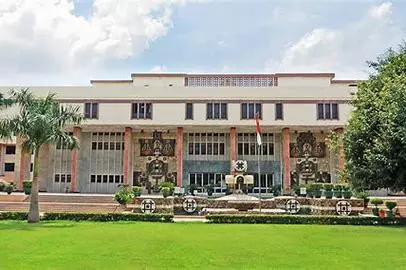- Home
- /
- Labour & Service
- /
- Once Worker Provides Testimony...
Once Worker Provides Testimony Under Oath, Burden Shifts On Employer To Disprove Claims: Delhi HC
Pranav Kumar
20 May 2025 11:03 AM IST
Delhi High Court: A single judge bench of Justice Manoj Jain dismissed a petition that was filed by the Deen Dayal Upadhyay Hospital. The hospital was challenging a labour court award that awarded compensation to a sanitation worker. The court agreed with the Labour Court and ruled that the worker had been in continuous employment for over 240 days, and was improperly terminated....
Delhi High Court: A single judge bench of Justice Manoj Jain dismissed a petition that was filed by the Deen Dayal Upadhyay Hospital. The hospital was challenging a labour court award that awarded compensation to a sanitation worker. The court agreed with the Labour Court and ruled that the worker had been in continuous employment for over 240 days, and was improperly terminated. However, the court only awarded compensation instead of reinstatement.
Background
Sangeeta was working as a sanitation worker at the Deen Dayal Upadhyay Hospital since May 2007. Her last drawn monthly salary was of Rs. 5500. As per Sangeeta, the hospital had failed to provide her with any facilities such as the HRA, transport allowance, leaves etc. She maintained that they paid her less than the minimum wages issued by the Delhi Government. When she brought these issues to the management in 2015, they terminated her services.
The hospital argued that all sanitation services were outsourced to M/s ACME Enterprises, and Sangeeta's name had not appeared on the workers' list provided by this contractor. The hospital claimed that when the contractor abruptly left in 2014, they were forced to hire daily wage workers to avoid work disruption. Once the new tender was finalised in April 2015, all daily wage workers' services were discontinued.
Challenging her termination, Sangeeta raised an industrial dispute. The labour court ruled in her favour and awarded Rs. 70000 in compensation. Aggrieved, the hospital filed an appeal.
Arguments
Sangeeta argued that she had been working since May 2007 continuously, and was directly employed by the hospital. She claimed that her services were only terminated because she objected to being paid less than minimum wage. She also provided details of various cheques issued by the hospital.
On the other hand, the hospital argued that Sangeeta was never an employee of the hospital. They argued that all sanitation services were outsourced, and only when the contractor abandoned their agreement, they had to temporarily hire daily wage workers. They claimed that Sangeeta failed to prove that she had been working continuously for 240 days before termination, which is mandated by the Industrial Disputes Act, 1947 (“ID Act”). Relying on The Superintending Engineer, Twad Board and Another v. M. Natesan (SLP(C) Nos.21962-21971 OF 2018), they argued that the burden of proving continuous employment was on Sangeeta.
Court's Findings
Firstly, the court held that as per Section 25F, ID Act, the initial burden to prove continuous employment for at least 240 days was on the workman. However, the court found that Sangeeta had already made specific and clear averments in her statement of claim and had also given details about the cheques issued by the hospital in her name. The court considered this sufficient, along with her “unchallenged” testimony given during examination-in-chief.
Secondly, the court noted that the burden of proof "keeps on shifting" and once Sangeeta provided her testimony under oath, it was on the hospital to disprove her claims. In this case, the court noted that even though the hospital claimed the sanitation services were outsourced, they had not provided any evidence of the contract with M/s ACME Enterprises. Further, they had also not provided the list of workers given by the contractor. Thus, the court ruled that the hospital did not discharge its burden adequately.
Thirdly, the court decided to award compensation and not reinstatement. The court noted that considerable time had passed and the worker was not hired through proper government recruitment processes either. Thus, it held, that compensation was more appropriate. The court cited Union Public Service Commission v. Girish Jayanti Lal Vaghela (Appeal (civil) 933 of 2006), holding that regular appointments to government posts without proper advertisement and selection would violate Article 16 of the Constitution.
Thus, the court refused to set aside the Labour Court's award. It dismissed the petition and ordered compensation of Rs. 70,000.
Title: DEEN DAYAL UPADHYAY HOSPITAL v. SANGEETA
Citation: 2025 LiveLaw (Del) 579
Decided on: 15.05.2025
Neutral Citation: 2025:DHC:3838
Counsel for the Petitioner: Mr. Tushar Sannu with Mr. Utkarsh Singh, Advocates
Counsel for the Respondent: Mr. Ankit Dwivedi, Advocate
Click Here To Read/Download The Order



